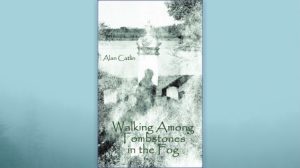
Once someone can leave aside the narrowminded attitude, a parallelism with the cultural outcome of the long-gone “counterculture”, and a few more notions considering guidelines for every-day afterglow, one can proceed step by step to the authentic study of the oriental classics, Zen or Buddhist literature, etc.
To find what? Pure nothing. Only what is not there, and that only by means of a potential association with a self, empty enough to fill the scripture, the poem. Lucien Stryk was empty enough to be a mentor and a master, among the very few masters of translation of Zen poetry.
Born in Kolo, Poland, in 1924, Lucien Stryk moved to Chicago with his family in 1927. Afterwards, he served in the U.S. Army, in the South Pacific, during World War II. His job was to locate and identify enemy lines, to identify targets, and radio the information to the American army. He carried a copy of Leaves Of Grass in his pocket.
Later, he taught at Northern Illinois University in the US, and at Niigata and Yamaguchi universities in Japan. He died on January 24, 2013, at his home in London.
His experiences in the war incited his interest in Japanese culture and literature. And he was not the only one, Reginald Horace Blyth was also intrigued by Zen poetry and Buddhism during the same period, living in Japan, and began writing his books on Zen and literature during his internment in a camp in Kobe.
Lucien Stryk’s work as a translator of haiku poetry, especially of the poetry of Matsuo Basho and Kobayashi Issa, was unique. His approach was centripetal. To this day, the haiku of Basho have never been translated in such a profound way.
During his career, Stryk received not a few honors and awards, all of which could never balance with his outstanding achievement in the art of translating haiku and writing about haiku. That noble and modest man was an example many ought to follow both in the academic and the freelance world. More work, less exposure to the literary and the not-literary media.
I was privileged and lucky enough to be a pen-friend of his, and to enjoy his correspondence from 1993 up to 1997; a period in which I was delving into the art of writing and, at the same time, translating haiku. After all these years, I remain his follower and a student of his penetrative viewpoint.
Lucien Stryk established a school of approaching Zen poetry, haiku. It’s a school which focused on the indivisibleness between poetry and Zen itself. That is something that may be considered obvious as one writes it right now in this magazine but is too crucial not to be taken seriously by many of the translators of haiku worldwide. Poetry is part of Zen, it is not combined with it and, certainly, it does not emerge from the depths of their amalgamation. The same goes for Zen. The same goes for the poet.
Should we put a shoe on our heads? Some may find it palliative. Who cares?
The fact that Lucien Stryk was a practitioner of Zen poetics, maybe denotes nothing nowadays, when Zen and haiku, are mostly considered just another fad in the circulation of social absurdity; yet the fact that he was a master translator of Zen poetry is rather uncommon.




Leave a Reply